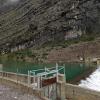News
Displaying Results 26 - 50 of 87
On 8 June 2023 Namibia became the first Southern African country, and 8th country in Africa, to accede to the Convention on the Protection and Use of Transboundary Watercourses and International Lakes (UN Water Convention).
Namibia, which has a population of some 2.5 million people, shares…
To address the conclusions of the review of the amended Protocol to Abate Acidification, Eutrophication and Ground-Level Ozone (Gothenburg Protocol), as adopted by the Executive Body to the UNECE Convention on Long-range Transboundary Air Pollution in December 2022, further work is currently being…
Finland and the Republic of Namibia, both countries which are strong advocates for transboundary water cooperation in their respective regions and globally, have just embarked on a two-year pilot Twinning Initiative to exchange experiences, build capacity and strengthen bilateral cooperation on…
Guaranteeing safe access to drinking water and sanitation remains a challenge in the pan-European region, with 16 million people still lacking access to basic drinking water services and over 29 million people not having access to basic sanitation, including hundreds of thousands who have to…
Research on and monitoring of the effects of air pollution on different environmental media and health has been carried out for more than four decades under the UNECE Convention on Long-range Transboundary Air Pollution. The data and research that has emerged from these efforts is unique as it…
How can regional and international cooperation be fostered in a region that faces unprecedented water scarcity? How can the benefits of this vital resource be shared to increase resilience to climate change?
The Third Baghdad International Water Conference titled "Water Scarcity, the Mesopotamian…
Air pollutants are not only harming human health and the environment but are also degrading surfaces of historical buildings and monuments. Corrosion and soiling of cultural heritage sites as a result of air pollution can lead to severe economic losses as a result of high maintenance and…
Uzbekistan is one of the world's largest producers of gold and uranium. In the last 40 years, Uzbekistan has built a strong mining industry, which is expected to grow in the years to come, given that only 20 % of the country’s territory has yet been explored. The expected rise in the number and…
Experts from Albania and Montenegro met in Shkoder (Albania) on 25 April 2023 to progress with the exchange of information on the shared Cijevna/Cem River. This was the second meeting of the joint technical group on monitoring and assessment established upon recommendation of the Implementation…
The massive use of fertilizers and the production and use of manure in agriculture over the past 100 years have led to significant reactive nitrogen emissions to air and releases to water and land. Burning of fossil fuels (in vehicles, power plants and industry) is another source of reactive…
Prevention of and preparedness for industrial accidents require special attention in Tajikistan, a country with a strong mining industry. The mountainous terrain of mining sites makes them highly susceptible to earthquakes, mudflows and floods, which can provoke Natech events (natural hazards…
A recent study published in The Lancet found that almost the whole world's population was exposed to unsafe levels of air pollution in 2019, with only a mere 0.001 percent breathing air that contains fine particulate matter (PM2.5) at concentrations lower than what the World Health Organization…
What are emission inventories and what purpose do they serve? Why is it important to develop emission inventories? If you don’t know the answer to these questions, you might be interested in taking the e-learning course on How to report emissions under the Convention on Long-range Transboundary Air…
Industrial safety and the prevention of accidental water pollution were high on Kazakhstan’s agenda this week, with the Second Meeting of the Inter-institutional Working Group on Tailings Safety and the Prevention of Accidental Water Pollution (IIWG).
The meeting brought together more than 60…
While the impacts of air pollution on vegetation and crops are sometimes overlooked, they can take a high toll on food production. As the food and energy crises have recently shown the vulnerability of our food systems, the impacts of air pollution on agricultural yields and food production should…
Joint efforts to harmonize data collection, strengthen monitoring and data exchange on water quality, develop early warning systems on water pollution at transboundary waters and improve collection and sharing of data on transboundary aquifers are needed for effective regional cooperation in…
With climate and biodiversity loss heading the news these days, another problem related to the planet we all share is often forgotten: air pollution. Air pollution has an enormous burden on public health, ecosystems, climate, and ultimately, the economy. Globally, the World Health Organization (…
Premature mortality attributable to poor air quality results in high costs. For example, a study by WHO and OECD estimates that in 2010 costs of air pollution related premature deaths in Georgia were at about 9 billion USD. The main sources of air pollution are the transport and agricultural…
The importance of clean air for the quality of our lives has recently been recognised by the United Nations General Assembly. What is more is that in the General Assembly session at the end of July, Member States overwhelmingly adopted a resolution recognising that a clean, healthy and sustainable…
Accidental water pollution, which can be sudden and heavy as a result of industrial accidents, endangers people and the environment where chemical activities take place near a river, lake or water body. Accidental water pollution events can be triggered by natural hazards, such as floods, lightning…
As Ministers from across the UNECE region gather in the Cypriot capital of Nicosia to outline new initiatives to work towards a sustainable and ecological future at the 9th Environment for Europe Conference (5-7 October), the final report on the Batumi Action for Cleaner Air (BACA), adopted 6 years…
With the review of the amended Protocol to Abate Acidification, Eutrophication and Ground-Level Ozone (Gothenburg Protocol) about to enter its final round, expert groups under the UNECE Air Convention are now discussing latest findings to assess the effectiveness of measures.
The amended Protocol…
All too often we take the air we breathe and share for granted. Only when we breathe very polluted air, when we can smell and see the pollution, do we realize that the air around us is a precious good that needs to be protected, much like the water we drink. On the International Day of Clean Air…
The majority of the ocean’s pollution originates from land-based sources and is washed into the ocean through rivers and other waterways. Turning the tide on marine pollution requires global action, and transboundary cooperation over shared waters forms part of the much-needed solution.
Maritime…
Making drinking water and sanitation services affordable for all is key to guaranteeing the human rights to drinking water and sanitation. In the human rights framework, water and sanitation services are unaffordable when paying for them would compromise the ability to pay for other essential needs…

























